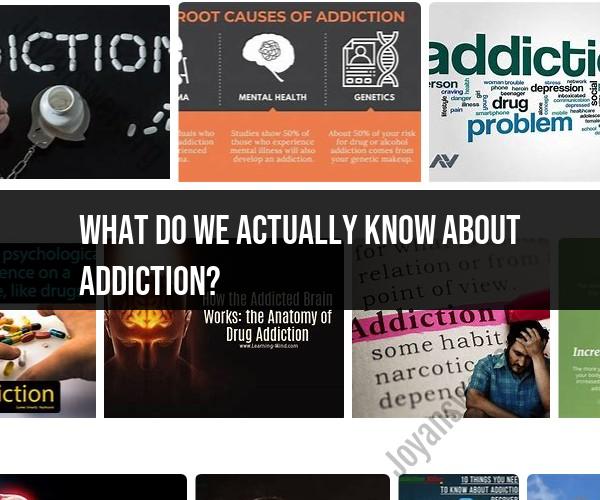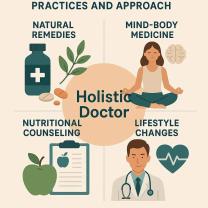What do we actually know about addiction?
Addiction is a complex and multifaceted phenomenon that has been the subject of extensive research and study. While our understanding of addiction is continually evolving, here is a summary of some key insights and knowledge about addiction:
Definition of Addiction: Addiction is commonly defined as a chronic, relapsing brain disease characterized by compulsive drug seeking and use, despite harmful consequences. It can involve substances like drugs and alcohol or behaviors such as gambling or gaming.
Brain Changes: Addiction is associated with significant changes in the brain's reward and motivation pathways. These changes affect a person's decision-making, self-control, and ability to resist cravings.
Genetic and Environmental Factors: Both genetic and environmental factors play a role in the development of addiction. Genetics can influence an individual's susceptibility to addiction, while environmental factors such as exposure to drugs or stressful life events can also contribute.
Dopamine: The neurotransmitter dopamine plays a crucial role in addiction. Drug use can lead to surges in dopamine, reinforcing the behavior and making it difficult to quit.
Tolerance and Withdrawal: Over time, individuals often build a tolerance to the substance or behavior, requiring more of it to achieve the same effect. When they try to quit or reduce use, they may experience withdrawal symptoms, which can be physically and psychologically distressing.
Behavioral Addictions: Addiction is not limited to substance abuse. Behavioral addictions, like gambling and gaming, can also lead to similar compulsive behaviors and brain changes.
Co-occurring Disorders: Many individuals with addiction also have co-occurring mental health disorders, such as depression, anxiety, or PTSD. These co-occurring disorders can complicate addiction treatment.
Treatment Options: There are various treatment approaches for addiction, including behavioral therapies, counseling, medication-assisted treatment, and support groups like Alcoholics Anonymous (AA) and Narcotics Anonymous (NA).
Prevention: Prevention strategies often focus on education, early intervention, and reducing risk factors. These may include school-based programs, public health campaigns, and efforts to limit access to addictive substances.
Long-Term Recovery: Recovery from addiction is a lifelong process, and many individuals can successfully manage their addiction with ongoing support and relapse prevention strategies.
Stigma and Misconceptions: There is still a significant amount of stigma associated with addiction, which can hinder individuals from seeking help. It's important to recognize addiction as a medical condition and treat it with compassion and understanding.
Research Continues: Addiction research is ongoing, and scientists are constantly studying the brain, genetics, and various treatments to improve our understanding and the effectiveness of interventions.
In summary, our understanding of addiction is continually evolving, but we do know that it is a complex interplay of genetic, neurological, psychological, and environmental factors. It is a treatable condition, and recovery is possible with the right support and interventions. However, addiction remains a major public health challenge, and efforts to prevent and treat it continue to be a priority in healthcare and research.
Addiction: Separating Facts from Fiction
Fiction: Addiction is a sign of weakness or moral failing.
Fact: Addiction is a complex disease that affects the brain and behavior. It is not a choice, and it is not a sign of weakness or moral failing.
Fiction: Addiction is only a problem for people who use drugs or alcohol.
Fact: Addiction can develop to anything that produces a pleasurable or rewarding effect, including gambling, shopping, sex, and video games.
Fiction: Addiction is incurable.
Fact: Addiction is a treatable disease. There are a variety of effective treatments available, including medication, therapy, and support groups.
The Science of Addiction and Its Impact on the Brain
When a person uses drugs or alcohol, it triggers the release of dopamine, a neurotransmitter that plays a role in reward and motivation. This creates a "high" that the person wants to experience again and again.
Over time, the brain adapts to the presence of drugs or alcohol, and the person needs more of the substance to produce the same feeling of pleasure. This is known as tolerance.
Another key aspect of addiction is withdrawal. When a person stops using drugs or alcohol, they may experience unpleasant symptoms such as cravings, anxiety, and depression. This is because the brain is trying to restore balance to its dopamine system.
Exploring the Complex Causes and Risk Factors for Addiction
There is no single cause of addiction. It is a complex disease that is influenced by a variety of factors, including genetics, biology, environment, and personal experiences.
Some people are more genetically predisposed to addiction than others. Additionally, certain mental health conditions, such as depression and anxiety, can increase the risk of addiction.
Environmental factors, such as exposure to trauma or abuse, can also play a role in addiction. People who use drugs or alcohol in social settings are also more likely to develop an addiction.
Addiction Treatment and Recovery: What the Research Shows
There are a variety of effective addiction treatments available. The best treatment approach for a particular individual will depend on their specific needs and circumstances.
Medication can be used to reduce cravings and withdrawal symptoms. Therapy can help people to understand and address the underlying causes of their addiction, as well as develop coping skills. Support groups can provide people with a safe and supportive environment to share their experiences and learn from others.
Recovery from addiction is a lifelong process. There may be setbacks along the way, but it is possible to live a healthy and fulfilling life without drugs or alcohol.
Shaping a More Informed and Compassionate Understanding of Addiction
It is important to remember that addiction is a disease, not a choice. People who are struggling with addiction need our support and understanding.
We can help to shape a more informed and compassionate understanding of addiction by educating ourselves and others about the disease. We can also support people in recovery by offering them our friendship and understanding.
Here are some things you can do to help someone who is struggling with addiction:
- Let them know that you care and that you are there for them.
- Encourage them to seek professional help.
- Offer to help them with practical tasks, such as running errands or taking them to appointments.
- Be patient and understanding. Recovery is a process, and it takes time.













